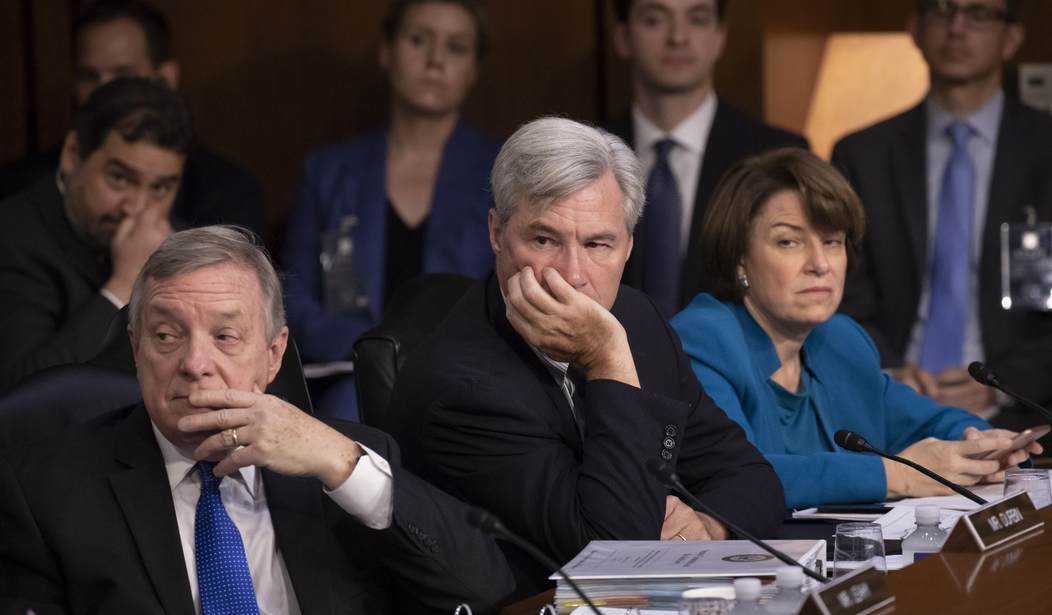Everybody dutifully played their part.
As soon as Senate Judiciary Chairman Chuck Grassley, R.-Iowa, opened his committee confirmation hearing for Supreme Court nominee Judge Brett Kavanaugh, Sen. Kamala Harris, D.-Calif., began interrupting him.
"I'd like to be recognized," she declared.
She was angry that the Trump administration had released -- just the night before -- tens of thousands of pages of government documents related to Kavanaugh's public service.
"You're out of order," Grassley said. "I'll proceed."
Harris ignored him.
"We cannot possibly move forward, Mr. Chairman, with this hearing," she declared.
Soon after, Sen. Richard Blumenthal, D.-Conn., called for simply canceling the hearing.
"I move to adjourn," he said repeatedly.
At some point, an organized group of protesters, who were infiltrating the hearing room and posing as citizens interested in watching the proceedings, began adding their voices to the "discussion."
They stood up and yelled at the senators from the back of the room. Two of their main themes: a claimed right to abortion and the alleged unwillingness of the committee, which had yet to substantively start its hearing, to thoroughly vet Kavanaugh.
Each time one of these protesters would stand and start yelling, the video cameras stationed in the alcoves above the left side of the hearing room would focus on the protestor as Capitol Police officers tried to remove the person from the room.
Soon, photographers were arrayed immediately in front of the back-of-the-room chairs where these protesters were deploying themselves.
Recommended
Each time another stood to yell -- and the Capitol Police closed in to remove the person from the room -- the photographers would begin taking pictures from close range.
During the hearing, a group called Women's March put out a Tweet taking credit for the orchestrated protests. "We're disrupting the Kavanaugh hearings every few minutes, with hundreds of women prepared to get arrested to prevent these hearings from moving forward," it said.
When Sen. Dianne Feinstein, D.-Calif., who is the ranking member of the committee, finally made her opening statement, she clarified why Senate Democrats and their outside allies were so adamant in opposing Kavanaugh.
"I want to talk a little bit about one of the big decisions that we have the belief that although you told Senator Collins that you believe it was 'settled law,' the question is really do you believe that it's correct law, and that's Roe v. Wade," Feinstein said in the written version of her statement.
Roe, of course, is the 1973 Supreme Court decision that declared abortion a constitutionally protected right.
Feinstein argued that Kavanaugh's opinion in Garza v. Hargan -- a case the U.S. Court of Appeals for the District of Columbia heard last year -- showed that from her perspective, he was wrong on abortion.
In Garza, the central question was whether a pregnant teenager caught illegally crossing the border into the United States had a right to an abortion here.
The U.S. Justice Department tried to evade this question, but Judge Karen LeCraft Henderson of the U.S. Court of Appeals for the District of Columbia answered it correctly.
"Does an alien minor who attempts to enter the United States eight weeks pregnant -- and who is immediately apprehended and then in custody for 36 days between arriving and filing a federal suit -- have a constitutional right to an elective abortion?" Henderson wrote.
"The government has inexplicably and wrongheadedly failed to take a position on that antecedent question," Henderson continued. "I say wrongheadedly because at least to me the answer is plainly -- and easily -- no. To conclude otherwise rewards lawlessness and erases the fundamental difference between citizenship and illegal presence in our country."
Judge Kavanaugh took a more nuanced position.
"In sum," Kavanaugh wrote, "under the government's arguments in this case and the Supreme Court's precedents, the unlawful immigrant minor is assumed to have a right under precedent to an abortion; the Government may seek to expeditiously transfer the minor to a sponsor before the abortion occurs; and if no sponsor is expeditiously located, then it could turn out that the Government will be required by existing Supreme Court precedent to allow the abortion, depending on what arguments the Government can make at that point."
The key precedent Kavanaugh was alluding to here was Planned Parenthood v. Casey, which upheld Roe and was co-authored by Justice Anthony Kennedy, for whom Kavanaugh clerked.
"Some 30 years ago, Judge Anthony Kennedy sat in this seat. He became one of the most consequential Justices in American history," Kavanaugh said in his opening statement at his confirmation hearing. "I served as his law clerk in 1993. To me, Justice Kennedy is a mentor, a friend, and a hero."
"And he was a champion of liberty," Kavanaugh said.
"Justice Kennedy," Kavanaugh concluded, "established a legacy of liberty for ourselves and our posterity."
Unless your posterity happens to be unborn.























Join the conversation as a VIP Member